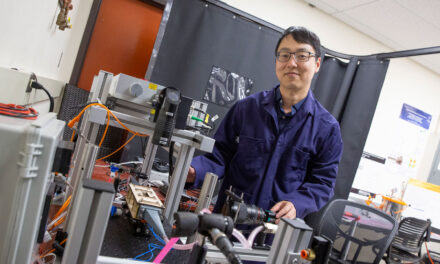
Mirchandani named Avnet Chair professor

The Avnet Chair endowment will support professor Pitu Mirchandani’s efforts to design, analyze and operate supply chain networks. Photo by Jessica Hochreiter/ASU
Arizona State University professor Pitu Mirchandani’s achievements in advancing the fundamental engineering and science involved in logistics has earned him the Avnet Chair in Supply Chain Networks.
Avnet Inc., a Fortune 500 company headquartered in Phoenix, is one of the world’s largest distributors of electronics components. The company also offers information technology services to businesses, as well as global logistics and programming services to enhance supply-chain operations.
Avnet endowed the Chair in Supply Chain Networks in recognition of ASU’s accomplishments and commitment to the field and to help strengthen the company’s relationship with the university.
As an Avnet Professor, Mirchandani will have access to the funds generated from the endowment to advance supply chain education and research.
Mirchandani is a member of the industrial engineering faculty in the School of Computing, Informatics, and Decision Systems Engineering, one of ASU’s Ira A. Fulton Schools of Engineering.
He is the director of the Advanced Traffic and Logistics: Algorithms and Systems (ATLAS) Laboratory at ASU, and is a senior sustainability scientist with the university’s Julie Ann Wrigley Global Institute of Sustainability.
Mirchandani has for decades been a leader in developing models for using real-time data with analytics and algorithmic processes to guide decision-making in the management of various systems and networks, said Ronald Askin, professor and director of the School of Computing, Informatics, and Decision Systems Engineering.
“He really is one of the originators of incorporating advanced modeling and information technologies into logistics planning and data-driven decision-making,” Askin said. Michandani’s research endeavors “translate into more students at ASU who are well trained in the supply chain engineering skills that businesses are looking for,” Askin said.
Mirchandani has applied his expertise during the past 30 years to efforts to optimize transportation and energy systems, water distribution systems, urban infrastructure planning and development, land use and health care.
He continues to broaden the scope of his work, looking at ways to improve real-time decision-making for blood bank systems operations, battery storage and recharge systems for electric vehicles, intelligent transportation systems and water quality, supply, storage and distribution networks.
Developing supply chain network models in these and other areas requires taking into account myriad factors involved in the design, development, manufacture and delivery of a product or service.
In addition, the modeling must consider in fine detail the integration of workforce management, facilities capacities, spatially distributed inventories, transportation routing, operations monitoring and quality assurance, among other areas.
The goal is to find the most appropriate solutions to managing complex systems, enabling managers to make quick planning and operational decisions under conditions that often have uncertainties and stochastic dynamics, Mirchandani said.
The key “is to ensure these decisions can be based on up-to-the-minute data, taking full advantage of computational technologies and associated big-data analytics” he said. “This is something that will make a very big difference to any business, industry or service enterprise.”
Mirchandani hopes to enhance the mathematical modeling employed in his field by making use of the growing number of sophisticated tools and methodologies made available by today’s advances in computer science.
“More specifically, I want to marry mathematical modeling and optimization approaches in industrial engineering to computer science. This will boost our capability to do more extensive real-time analysis and decision-making,” he said.
Mirchandani began his work in the field while earning a doctoral degree in operations research at the Massachusetts Institute of Technology (MIT).
He also earned a master’s degree in aeronautics and astronautics at MIT, after receiving bachelor’s and master’s degrees in engineering from the University of California, Los Angeles.
He has be a prolific author of scholarly books and papers and been very successful in attracting research funds from governmental agencies, foundations and industries. In recent years he has been funded by the National Science Foundation and U.S. Department of Transportation.
Mirchandani is the third ASU engineering professor to be awarded an Avnet Chair Professor position in supply chain networks. Previous holders of the chair were professor Dan Shunk and professor John Fowler.
Media Contact
Joe Kullman, [email protected]
480-965-8122
Ira A. Fulton Schools of Engineering



































